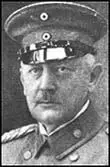Helmuth von Moltke

Helmuth von Moltke was born in 1848. His uncle, Moltke the Elder, was a famous Prussian General famed for important military victories in 1866 and 1870.
In 1906 Moltke replaced Alfred von Schlieffen as German Army Chief of Staff. Though he maintained his predecessor's war plan, he adapted it to the French military build up in the south. After the outbreak of the First World War Moltke was able to convince a doubtful Kaiser Wilhelm II to follow the Schlieffen Plan.
Moltke proved to be indecisive during the invasion of France. Failure to give clear orders during the Battle of the Marne resulted in field commanders ordering a retreat. Wilhelm II was unimpressed with Moltke's performance and he was retired and replaced as German Army Chief of Staff by Erich von Falkenhayn.
Helmuth von Moltke died in 1916.
Primary Sources
(1) Helmuth von Moltke, memorandum sent to Theobald von Bethmann-Hollweg (July 1914)
Unless Germany means to break her word and allow her ally to succumb to Russian superior strength, she must also mobilize. That will lead to the mobilization of the remaining Russian military districts. Russia will then be able to say, "I am being attacked by Germany" and that will make her sure of the support of France who is bound by treaty to go to war if her ally Russia is attacked. The Franco-Russian agreement, so often praised as a purely defensive alliance brought about only to meet German plans of aggression, comes thereby into operation and the civilized states of Europe will begin to tear one another to pieces.
Germany does not want to bring about this terrible war. But the German Government knows that it would fatally wound the deeply rooted sentiment of allied loyalty, one of the finest traits of the German spirit, and place itself at variance with all the feelings of its people, if it were unwilling to go the help of its ally at a moment which must decide that ally's fate, Germany therefore, if the clash between Austria and Russia is inevitable, must mobilize and prepare to wage war on two fronts.
